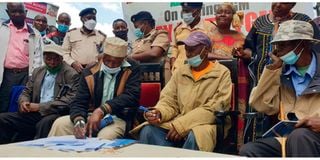Kuria men commit to FGM eradication

Kuria elders sign a memorandum to end female genital mutilation in Kehancha town on October 8, 2021, after a consultative meeting with officials from the Anti-FGM Board.
What you need to know:
- They spoke after a three-day sensitisation programme in Isebania town under the theme 'Men End FGM'.
- They were drawn from the four Kuria clans of Bugembe, Bwirege, Nyabasi and Bukira.
- They have trained their efforts on the March-April school holidays when girls will be at home following fears that the exercise may be conducted.
Men from the Kuria community have vowed to support the war on female genital mutilation (FGM) to bring it to a successful end.
They spoke after a three-day sensitisation programme in Isebania town under the theme 'Men End FGM'. They were drawn from the four Kuria clans of Bugembe, Bwirege, Nyabasi and Bukira.
The participants have trained their efforts on the March-April school holiday following fears of planned rite of passage exercises.
“We have been trained in the effects of FGM, which has not only impacted negatively on our girls’ health but also affected our development as a region. We have joined the renewed efforts to scale down the practice,” Mr Chacha Rioba told Nation.Africa after the meeting.
Leadership roles
Lake Region Development Programme coordinator Peter Shikuku, who led the training, noted that “protecting and safeguarding girls’ rights are fundamental and have to be respected at whatever cost."
“Men, being the key decision makers at the family levels, should be at the forefront of the fight against FGM and ensure the girls are not only safeguarded but also given a right to secure their future through education. They are the gatekeepers and if they say no to the cut, then FGM will cease,” he said.
He said that together with other Anti-FGM stakeholders, they have tasked the trained men to pass the information in their barazas and homesteads in an effort to scale down the vice.
Mr Shikuku urged Kuria men to say no to FGM as they are the key pillars of the community and wield immense influence.
Men End FGM Foundation official Catherine Kekungu said most circumcisers perceive the vice as a source of income. She pointed out that the Anti-FGM Board has assisted most reformed circumcisers across the country to generate income and asked the Kuria circumcisers to come out to get empowered through other livelihoods.
Grassroots advocacy
Mr Peter Kemei, the head of programmes at Men End FGM Foundation, said men’s voices are crucial to ending FGM. He noted that men are leaders and should act as role models through grassroots advocacy forums.
Mr Kemei said President Uhuru Kenyatta had done so much to ensure the vice is ended by this year. He noted that the Head of State is committed to the cause.
The official pointed out that grassroots organisations and partners in the anti-FGM fight are incorporating men to breathe life into the campaigns.
The three-day training came barely a week after anti-FGM stakeholders in Migori County led joint campaigns. In a conference held in Kehancha town last Thursday, they resolved to continue the fight.
Those present included elders from the four clans, government officials, reformed circumcisers and activists. Kuria West Assistant Commissioner Lilian Wabala warned of “punitive actions against perpetrators.”
“It is not going to be a walk in the park. We will smoke out the perpetrators and ensure they face the full force of the law because it seems dialogue has failed,” Mrs Wabala said, reiterating the government’s commitment to ending the practice this year.
“Ending FGM is a joint effort and we will be working closely with elders and law enforcement agencies to address the menace,” she noted.





